VMware President Sumit Dhawan Takes On Broadcom Deal, R&D And Partner Questions
CRN asks partners what they want to hear from top VMware brass as the company prepares its first—and possibly last—VMware Explore as an independent company.
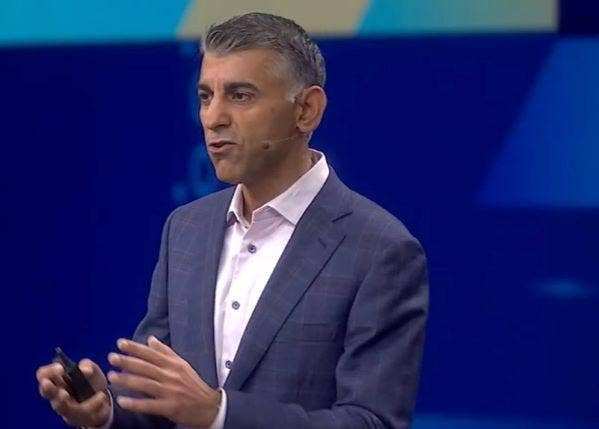
Whatever plans VMware had prior to May were surely disrupted when Broadcom appeared with a $61 billion deal in hand.
Since then, the company that had banked on 2022 being its year of independence, is now staring at being taken over by its third owner in the past 20 years: this time the giant chipmaker Broadcom.
Throughout this tumult—which has included high-level executive departures on both sides of the deal— VMware President Sumit Dhawan told CRN the company has not stopped executing on its goals: overhauling its partner program, Partner Connect; debuting updates to its flagship compute product vSphere as well as to its storage product vSAN; and embracing multi-cloud.
[RELATED STORY: AS VMWARE EXPLORE BEGINS, COMPANY PRESIDENT VOWS ‘INNOVATIONS ARE HERE TO STAY’]
“What we’re seeing is customers adopt the power of new innovative services that are coming from different clouds because different clouds deliver different innovative new services,” Dhawan said. “Some may provide better searches in an elastic fashion, some may provide cheaper storage, some may provide better identity services. And across these different clouds, customers are sort of now creating the next-generation architectures of modern applications that assemble these services across cloud. And our innovations are centered around it.”
Dhawan sat down for an interview ahead of VMware Explore in San Francisco. This is the company’s first event since being spun out of Dell Technologies last October. While the company’s plans for a multi-cloud future could be disrupted by Broadcom, Dhawan said he doesn’t think so.
“We are making these announcements with the full belief that these innovations are here to stay and serve the customers for years, if not decades to come,” he said.
Here’s what he had to say about the Broadcom deal, aligning the business with technically sophisticated partners, R&D and what’s ahead for leadership.
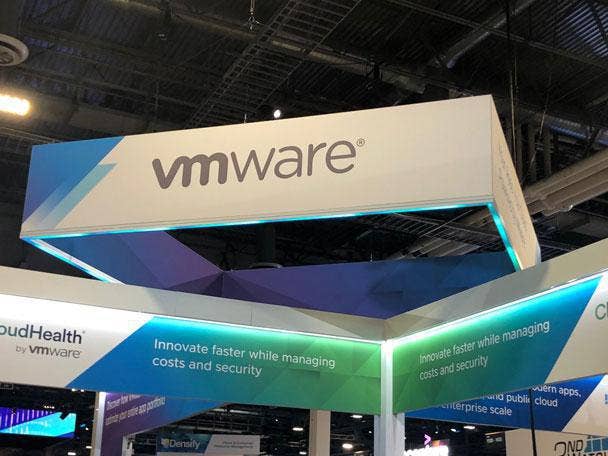
One partner said there’s a divide in the VMware partner base between the folks he calls ‘paper shufflers,’ the partners who produce large volumes of sales, and the partners who are levered towards engineering. He said VMware now favors those ‘paper shufflers,’ as he calls them, and he said he wants to know how you plan to reward businesses like his that are built around creating and delivering complex solutions?
I think, first of all, it’s a fair comment and a little bit reflective on where we have been [recently] because that was then the name of the game at that point of time. And as the role of this ecosystem is evolving, we are evolving our partner programs.
Have we resolved every particular item and are we fully into this new era where everything is rewarded purely based on the engineering progress versus driving volume of the business?
No, there will always be a need for both because the volume partners serve the needs for representing VMware among a large volume of customers but may do so for more basic or medium needs. And we will have appropriate incentive recognitions, and our partner program and cater for that. But it doesn‘t need to cater for that exclusively.
Our partner program will expand for partners to invest with us in building more sophisticated skill sets in the rich multi cloud portfolio of ours. ... And we will reward those partners across a whole range of life-cycle services. And our goal there, through our partner programs, is profitability and revenue growth for our partners. We understand if revenue and profitability is not there for the partners then the incentives for them to invest won’t be there. And collectively, we won’t accomplish our objectives and our customers won’t win with multi-cloud.
So I think we are taking steps to improve it. But I don’t think it’s a shift from one model to the other. It’s more realizing that there is a world where both models will be needed. And our partner program is designed to incent partners of both kinds. And we are going to learn and evolve. No program that gets launched gets 100 percent of the things right. We believe we have taken steps forward. But our strategic and business intent is to 100 percent address the needs of the partners who are invested with us and, more importantly, investing with us with a full multi-cloud portfolio.

When you say you’re taking steps to improve that, can you tell me maybe one or two of the steps? So you don’t have to go into great detail on it, but what are one or two of those steps?
I think you will see consumption-centric incentives as part of Partner Connect because those incentives are only driven by partners who are more connected with the customers and have deeper engineering skills.
Without those, those incentives are not really applicable to partners who are simply paper pushers. Now, you know, in defense of our larger partners, I would say it’s a little bit of a raw characterization to call those partners simply ‘paper pushers’ because they’re also investing in their engineering skills. But the point is someone who has invested in engineering skills and customer relationships, and then drives customers in successfully adopting and consuming our software, we are incenting them. And we’re continually assessing if those incentives are sufficient for profitability. But that’s an example of how we have enhanced the program.
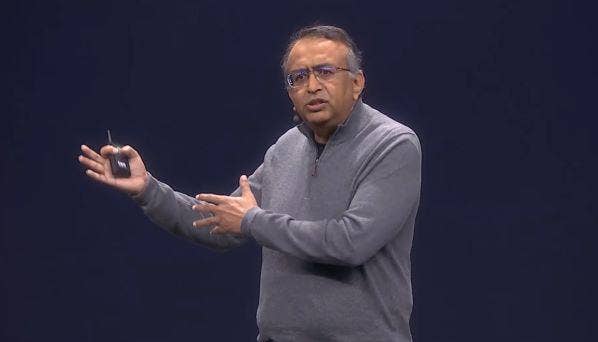
Can you can you give us any sort of idea of what leadership is going to look like post-transaction? Are you going to remain? Is [CEO] Raghu [Raghuram] going to remain?
Firstly, it’s important for you and the partners to understand that the strategy, or the strategic rationale, for Broadcom to pursue the transaction is all based on our vision. Our vision, which is outlined with the innovation that we are launching at Explore and the vision that helps our customers get the choice and flexibility to modernize, build, connect, protect all of their applications consistently across all the clouds. That is the vision, that is the foundation and the cornerstone of Broadcom’s rationale in terms of pursuing the acquisition.
We are at this point in time continuing what we call post-closing planning with [Broadcom CEO] Hock [Tan] himself. He is deeply engaged with us, which is good.
At the end of the day, it’d be wrong for me or Raghu, to say, ‘We will be the ones running, running the business.’ Really we serve the shareholders, stockholders and, in this case, it will be the decision that to some extent, during this post-close planning on the leadership structure for and that that will emerge through the discussion.
But in the meantime, there is nothing that we are doing or stopping doing because of this transaction because the transaction is designed with the strategic rationale behind the vision we put in place. Everything that is being built is built in a way so that this continues regardless of how and who is leading it. Hopefully, that doesn’t become a deterrent for not pursuing the vision.
Having said that, this is not to say we aren’t going to be there, I’m just saying that’s where we are in terms of post-close discussions with Hock at this point.
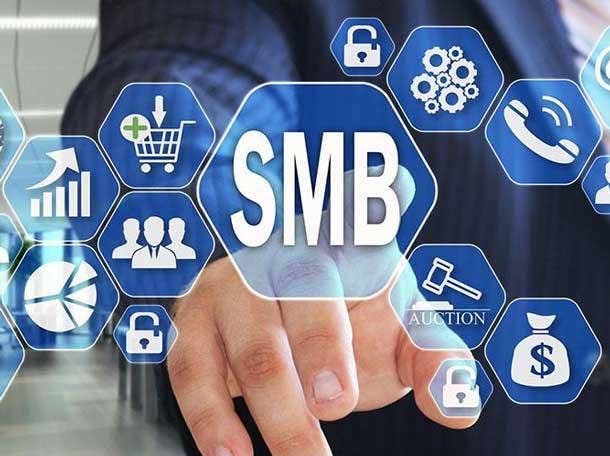
So I have another question here from a partner that said to ask about the focus on enterprise versus SMB. Are we going to see VMware favor larger accounts versus sort of the downstream accounts in the SMB?
I can comment on VMware’s business and our conversations so far with Broadcom. But Broadcom would be the right people to comment post-close.
VMware business is very, very different than any of the other acquisitions they had. ... We have a lot bigger pool of customers. Our concentration of business in a small set of customers is not quite there. And our segments of customers use our different sets of solutions in different ways.
We realize that. And so does Broadcom because they’ve had all of the conversations with us. As a result, making the assumption that whatever Broadcom Software Group did with prior acquisitions in software would be the same formula for VMware we believe that would be business suicide because of how our business is structured, how our customer base is structured.
In fact, to some extent, we believe that the path that we are on at this stage in terms of how we are innovating with an ecosystem that gives customers choice, as well as how we’re defining partner programs is the path that is strategically aligned with how Broadcom sees our business going forward.
Obviously, we envision different segments of customers having appeal to different parts of our portfolio because of their readiness for multi-cloud.
The bigger enterprises we see are jumping into a holistic portfolio of ours and requiring deeper engineering skills from a range of partners, and the customers who are in the other end of the spectrum may be taking a first step on the cloud with our VMware Cloud products. And they’re not quite there with adoption of Kubernetes, for example.
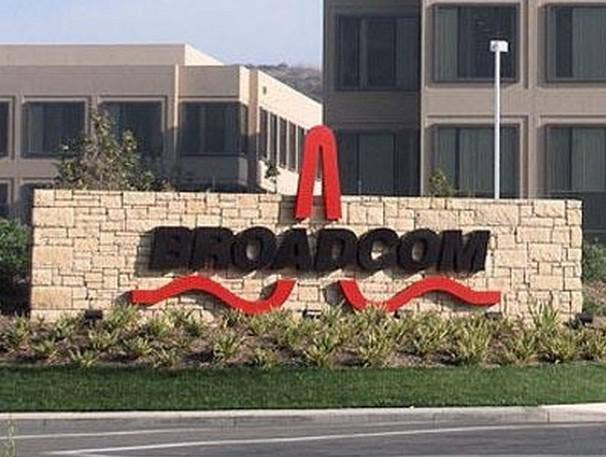
The Broadcom deal, according to all sorts of reports, came about very suddenly. I just wonder what was your first impression when you heard about it?’ And has your impression of the deal changed from the time you first heard about it—somebody said, ‘Hey, Broadcom wants to buy us—to now that you’ve been kind of working with them and talking to them? Has your view of the company, maybe the value of the transaction, changed at all?
I always saw Broadcom as a financially strong company with world-class management.
I didn’t know enough about the semiconductor market and the role that Broadcom plays in that market. And so I’ve learned about that since then. And what’s impressive is their track record of R&D investments and making the successful relationships with their customer base, which are the two big principles for VMware as well. Obviously, partners help us accomplish it. But the two things that really ground us are investing in innovative R&D solutions and making customers successful.
Now, I think, the more time we spend with Broadcom, the more we are seeing how VMware will become the cornerstone of Broadcom’s software business. We’ll maintain a commitment to those two things that I mentioned—innovation and customer service—because that’s been the core to our success. And I think that aligns very well with Broadcom. That actually is giving us more and more encouragement, the more time we spend with Broadcom.

Dollars in hand
The R&D numbers on the Broadcom Software Group side are much lower—in terms of the portion of revenue, they invest [14 percent] in R&D compared to VMware, which invests around 23 percent to 24 percent of revenue into R&D. If those two groups come together do you foresee VMware keeping its R&D spend at around the higher 23 perent to 24 percent mark?
I think percentage of revenue is an interesting metric, but if you look at another trend that with Broadcom, and I probably don’t have the exact numbers, but Broadcom shares this publicly. Post-acquisition, their actual R&D investments have outgrown the revenue of the companies they have acquired.
So the track record of investing post-acquisitions, and even increasing the investments on R&D for Broadcom, is extremely high. So percentage of revenue can be tricky because of the size of the revenue base itself. But if you look at it purely in the sense of rate of growth of R&D investment compared to the rate of growth of revenue, and if that’s higher, post the acquisition, then that means the company is quite committed to investing in R&D. And that’s sort of what gives us encouragement because they believe in R&D investment.

The last question here is just around this idea you were talking about earlier. The reason that Broadcom wants to purchase VMware is because of your vision, VMware’s vision. And you said, this is going to be the vision that’s laid out at the show. I’d love to hear how much confidence do you have in the presentations that are being made, the announcements that are being made, that this is real, is here to stay whether or not in a year from now you are a division of Broadcom?
At this stage, we have full belief. Otherwise, it would be wrong for us to move forward with any of these announcements. We are making these announcements with full belief that these innovations are here to stay and serve the customers for years or decades to come. We don’t take this easily. We don’t take those decisions easily in terms of which markets we invest in, what products to launch. We don’t have a huge portfolio, entering every possible market. We have three major focus areas. And across those three major focus areas, we’ve got four or five major product lines. And those product lines, across our portfolio, are designed in a way where we provide unique differentiated and sustainable solutions and business models for our customers and partners.
That’s the objective when we introduce our products and portfolio. And that’s no different this year than what we have done before. We have a firm belief that they’ll keep providing sustainable value to our customers.
Any closing thoughts?
One thing to take away is this new chapter we are in would not be possible for both customers and VMware without the ecosystem. We have done this with building out a software-defined ecosystem. And I am confident that VMware partners will be the ones who will get this ecosystem together to make our customers successful for multi-cloud and profitability for the rapidly evolving needs of our ecosystem. That’s our goal. And that’s the announcements we are making with technology partners as well as what we have made with our partner program.